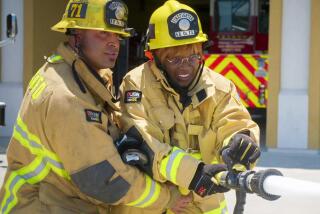Viewers Changing Face of TV News
TV or not TV. . . .
TALKBACK: Direct viewer participation in Gulf War coverage--through phone calls and faxes given on-air exposure--has changed the face of TV news.
Traditional network reporting--from distant, unreachable oracles--now seems a bit dated after the new practices that have been developed effectively by C-SPAN and CNN.
The impact on old-line network journalism is highly visible. CBS’ “America Tonight,” for instance, has invited faxes and phone calls from its “correspondents around the globe” in national TV town meetings--with the next two airing March 20 and 29.
None of the practices are entirely new. CBS’ “60 Minutes,” for instance, has long incorporated letters from viewers. And national TV town meetings are occasionally mounted by such series as ABC’s “Nightline.” Phone-in segments, meanwhile, have become increasingly popular because of the explosive growth of talk-radio.
But never has the new face of TV news been so clear as in the Gulf War. C-SPAN, a pioneer in direct viewer talkback to its guests--government officials, journalists and the like--may be relatively tiny in size, but its impact on television has been gigantic.
CNN, with its 24-hour news programming, has so saturated its format with phone segments and viewer faxes read aloud that it is difficult to think of TV journalism routinely going back to its old ways.
And it isn’t.
The electronic town meetings on “America Tonight,” which deal with the war’s aftermath, offer a toll-free number on which “viewers will be able to ask questions and offer comments on the issues still unresolved.”
Adds CBS: “Viewers can also fax in their comments at any time” to a special number.
It’s a pity that “America Tonight,” whose principal anchors are Charles Kuralt and Lesley Stahl, will be leaving the air March 29 after a six-month run that was prolonged by the outbreak of the war.
Originally, the late-night series was a stop-gap measure that at least hoped to bring some prestige to CBS in the key 11:30 p.m. time slot where entertainment shows had failed.
It accomplished its task--and more--in just a brief time on the air. But a CBS spokeswoman says even staffers aren’t complaining that the show is going off because they’ve been doing double duty--combining the series with other assignments.
What that shows is a dangerous and telling lack of financial commitment to a worthwhile news product by CBS management, which should have realized it has something going for it in “America Tonight”--a rare niche of distinction on the network.
Too late now. Starting April 2, CBS will present a group of late-night crime series that could well make the network just as faceless as it was before in the competition against Johnny Carson and “Nightline.”
It’s a crime.
DOUBLE EXPOSURE: Bernard Shaw’s Gulf War reporting has made him so valuable to CNN that he now anchors two nighttime newscasts that give him maximum exposure on the East Coast and the West Coast.
The live programs air in prime time--8 and 10 p.m.--in the East, and at the height of evening news competition here, 5 and 7 p.m.
“We wanted to give things a little oomph with Bernie,” says CNN spokesman Steve Haworth. “His profile is the best-known of any CNN anchor. And we wanted to have more visibility on the West Coast in our programming.”
PRO AND CON: Mixed opinion of the media during the war came across in phone calls to CBS after last week’s “60 Minutes” segment about correspondent Bob Simon and his crew, released from captivity in Iraq.
A CBS spokesman said about 28 calls were received. Some were supportive, like the one that said, “I’m glad your guys are home. Thanks for showing them.” But there were also negative calls about Simon and his crew, who were captured while out looking for a story.
“Tell Bob Simon and his crew just to do their jobs. They wouldn’t have gotten caught and be there dramatizing their story if they had been,” said one caller. “They deserved exactly what they got because they were where they weren’t supposed to be,” said another. “I’d rather see our own POWs released instead of them,” said yet another.
ACE HIGH: Nobody was ever like her, so it’s swell that TNT cable is running a Myrna Loy festival--including “The Best Years of Our Lives” and “The Thin Man Goes Home”--on March 28, three days after she’s honored for lifetime achievement at the Academy Awards.
MUSIC PLUS: What an inspired idea Sunday when ABC’s “Life Goes On” used Leon Redbone as a mystical, musical narrator of an episode in which Chris Burke, the young actor with Down’s Syndrome, got lost in a tough Chicago neighborhood.
BOY MEETS GIRL, MAYBE: Turns out that “Anything but Love” couldn’t be a more appropriate title for the ABC series. Twice now, the episode in which stars Richard Lewis and Jamie Lee Curtis consummate their relationship has been preempted--last week by President Bush’s speech. The episode is scheduled again for Wednesday, and ABC is hoping that the consummation will finally be consummated.
SEAL OF APPROVAL, OR SOMETHING: It’s now official. Peter Arnett is a celebrity. He made the National Enquirer.
DRAWING BOARD: Paula Zahn, co-anchor of “CBS This Morning,” will host the 1992 Winter Olympics with Tim McCarver, which means she’ll spend three weeks in prime time. In her first year on “This Morning,” just concluded, the show’s ratings were up 9%, an increase of 235,000 viewers.
BEING THERE: “My name is Rhoda Morgenstern. I was born in the Bronx, New York, in December of 1941. I’ve always felt responsible for World War II.”--Valerie Harper in “Rhoda.”
Say good night, Gracie. . . .
More to Read
The complete guide to home viewing
Get Screen Gab for everything about the TV shows and streaming movies everyone’s talking about.
You may occasionally receive promotional content from the Los Angeles Times.






